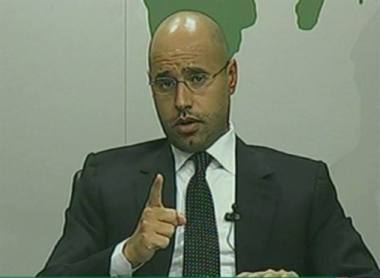
Since the Arab world’s popular uprisings began, the average Cuban citizen walks about very confused by the disparity of the accounts of the press and the ones from people who claim they “saw it all through the antenna” or from people who were told of it by someone who saw it all through the antenna, which is why with the internet in mini-doses I will devote some of this volatile time to the search for the other side of the war omitted by the zealous journalists of my Cubita the Beautiful.
Our government’s affinities to the Gadhafi and Al Assad regimes span decades, which explains their support to both of them. But it is one thing is to support a government, regardless of how questionable it is (as is the case) and a very different one to hide the fact that those same governments have attacked their own people with landmines, with ammunition of raw uranium, with a mercenary army —the term CAN be used there— and other, equally reproachable methods.
I have to endure Gadhafi’s boy, so macho and threatening; I need to endure Hafez’s boy when he declares that the revolts have been provoked by infiltrated foreigners—even Syrians don’t buy that—but we Cubans take that with a grain of salt, and I can almost hear my neighbor Tomás protesting the horror those people are going through, those people who will not be overwhelmed by the national outcry enough to resign.
Every time I see images from Libya, those unmistakably green banners appear, pointing toward where the camera of the Telesur correspondent needs to aim. Incensed with such partiality, my husband, with sarcasm, brings me back to reality: “It’s the version meant for us. Don’t watch Walter Martínez. Don’t watch the newscast. Or don’t watch the war on the internet anymore.”
Translated by T
May 4 2011
